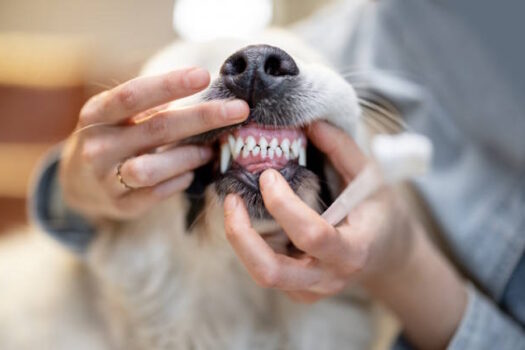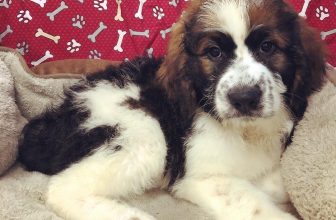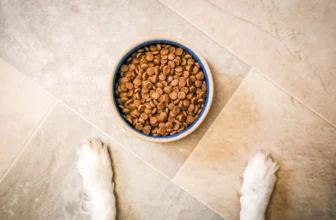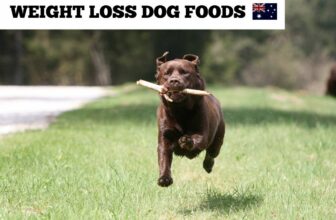How to Improve Dental Health in Dogs & Cats

If you want your cat or dog to stay healthy for many years to come, you should always consider their dental health.
Why?
It doesn’t matter whether you feed your dog kibble, BARF, or any of the top rated brands on this website. Personally I don’t see any commercial brand of pet food to be good for dental health, and this is almost always overlooked by us as pet owners.
Simply put, none of these foods will keep your pet’s teeth free from plaque and tartar.
Left unaddressed your pet’s teeth may rot, even during the kitten or puppy phase. This can develop into dental decay and periodontal disease, which is very bad news for your pet.
Did you know bad teeth can cause all manner of health problems:
- Heart disease
- Kidney disease
- Liver disease
- Respiratory disease
- Diabetes
- Weak immune system
- Pain and discomfort
You can see why I see dental health as one of the most important aspects of pet ownership.
If you want to know more about periodontal disease being a precursor to all of the above detrimental conditions then I’ll cover them in more depth shortly, but first lets address simple ways you can help your dog or cat keep their teeth clean:
Simple ways to prevent your pet suffering poor dental health
We often think of our pets as furry companions. Lovable, cuddly members of our family.
Because of this we often forget their roots as predator animals. It might be hard to imagine your Bichon Frisé devouring the carcass of freshly caught prey, but this was what their ancestors instinctively did to survive.
If it wasn’t for your dog or cat’s instinctive prey drive, or that of their ancestors, they wouldn’t be here today being overfed sugar-based treats and kibble made of processed wheat and corn.
Keeping the above in mind, lets consider the simple reasons why wild cats and dogs don’t suffer the same dental disease our domestic pets suffer all the time:
Why do wild cats and dogs have better dental health than our domestic pets?
There are two simple reasons:
- Natural diet of raw meat, bones, and connective tissue – The simple process of chewing, tearing, and gnawing offers many wild animals natural “dental cleaning”, preventing the buildup of harmful bacteria and scraping away plaque and tartar. Nature is amazing, isn’t it, so why do we overlook these simple facts when we feed our pets?
- Lack of processed foods – Pet food companies will always try and convince you (and veterinarians) the products they sell are healthy and the absolute best for your pet, when the reality is most are high-carbohydrate, high-sugar processed foods. We already know the reasons carbohydrates and sugars are bad, and much more so for carnivorous animals like cats or facultative carnivore dogs, yet we fail to connect the dots. Soft and processed foods do not provide the same mechanical cleaning benefits as a raw or prey diet.
There are some other reasons why wild cats and dogs have better dental health than domestic pets, but the above two simple points are what you should focus on the most.
With that in mind, we can easily understand ways we can help our domestic pets retain better dental health.
Four simple ways to help our domestic pets have better dental health
We’ll start with raw meaty bones as my best recommendation, but if this isn’t for you then the other options will still help.
As pet owners we are responsible for keeping tabs on the health of our pets, so getting in the habit of checking their teeth regularly is a must.
Raw meaty bones
Cheap, natural, and healthy. Raw meaty bones will excite most dogs and cats, and are one of the best ways to help them keep their teeth clean.
For your cat this could be chicken necks, wings, drumsticks, or frames, and these work for most dogs as well.
Depending on the size, breed, and eating habits of your dog, you could chose larger non-weight bearing bones. Just be weary of bones which can be swallowed whole and cause an obstruction, and never feed cooked bones.
Always monitor your pets if you consider feeding them raw meaty bones a risk.
Did you know feeding your pet raw, or even part raw can be cheaper than feeding them a commercial pet food?
Avoid or limit processed pet foods
Many pet foods are undoubtedly cheap, or “affordable”, and most of us can’t offer our pets a diet fit for a king or queen, but we should always consider what those processed foods are made of and what we can do about it.
Keep in mind most commercial pet foods sold in Australia are high-carbohydrate, high-sugar, with questionable nutritional benefit for our pets.
We live in a world where grain-manufacturers turn the waste they can’t sell to us into the profit-machine which is “pet food”.
Almost all commercial pet foods, of which global conglomerates like Mars and Nestle make most of the brands you’re told are the best for your pet, are made mostly of grains, or if not grains then potatoes or legumes.
How crazy is that for your meat-loving dog, or your true carnivore cat?
Consider the simple reason for this – Is it for the health of your pet, or because it makes those companies billions of dollars?
Even if your budget means you must feed those pet foods, keep in mind you don’t need to feed them all the time.
Why not supplement those diets with the raw meat, organs, and bones we spoke of earlier?
Why not add in cost-effective real foods which are healthy for your pet, such as appropriate table scraps or super nutritious eggs, sardines, or a few healthy fresh veggies?
If you can afford a better brand of pet food, this can show dramatic improvements in the health of your pet. You may not realise it straight away, but a better pet food may lead to less health complications in later years and many more years of happiness.
Give your pet something to chew
Many new pet owners tear their hair out when their new puppy destroys their shoes, toes, and furniture. Have you been there?
Quite often the simplest solution is giving them something they would instinctively chew.
If not raw meaty bones (which many breeders wean pups on these days), then offer them tough meat-based chews, bully sticks, goat horns, antlers, tendons, or even rabbit or cow ears.
Sometimes a little peanut butter (100% peanuts) or duck/goose fat smothered on a goat horn will encourage your dog to chew, and this can keep them occupied for hours.
Tough and robust toys such as KONG can help, and the peanut butter trick works on them too. Perhaps not as ideal as real animal meat chews, but still a good choice – and great to keep your dog busy as well!
Brush their teeth
I confess to having never brushed any of the teeth of my dog, cat, or previous pets. I’ve never needed to as I use the methods above.
My 14 year old cat Berno has great teeth, free of plaque and tartar, often leaving my veterinarian (who recommends grain-based processed foods) very surprised.
Go figure.
However, there’s no shame in brushing your pets teeth. Sometimes it’s hard with a cat, but can be a fun bonding routine you can do with your dog.
Brushing your pet’s teeth will definitely help keep them clean, but make sure you choose a decent, healthy, or natural tooth paste appropriate for your pet.
What else can we learn from wild dogs and cats about dental health?
A natural diet and lack of processed foods aren’t the only reasons why wild cats and dogs display far better dental health than our domestic pets.
Lots of chew time
Wild animals spend more time chewing, whether on prey (bones, cartilage, hides), or on other chewable objects such as sticks (not ideal). This naturally leads to better dental health and strong gums.
Regulated eating
Most wild animals have frequent but controlled eating, usually smaller and less frequent meals. Our pets on the other hand almost always have access to an abundance of food, usually processed and stacked with carbohydrates.
Activity levels
Many domestic pets are confined to our four walls most of the time. This isn’t the case for wild counterparts who tend to be more active, and we know how much being active can benefit our health.
Did you know most working dog foods contain more carbohydrates, more sugars, than regular dog foods. I don’t see this as healthy for any dog, but you can argue working dogs are more active and will burn off those inappropriate carbohydrates.
And before you start thinking carbohydrates are beneficial for active working dogs, turn your thoughts to big cats and wolves who have excellent energy levels when they need it without any carbohydrates in their diet.
Natural selection vs breeding
Brachycephalic (short-nosed) breeds like Bulldogs and Persian cats are prone to dental issues due to their jaw structure. If you put these breeds in the wild they simply would’ve survive natural selection.
Wild animals in nature have adapted through natural selection, and this process has weaned out animals with severe dental issues who are unable to hunt, eat, and defend themselves properly.
If we own any domestic breed of dog, particularly a brachycephalic, we must be mindful of the consequences of poor dental health.
Lifespan
Lifespan can’t be overlooked, and when comparing domestic pets to wild counterparts it must be considered wild animals will often have a shorter lifespan.
If the teeth of a wild animal rot it is likely the animal will perish, whereas our domestic pets benefit from our care, the help of veterinarians, medicine, operations, and a constant supply of food (even if it’s just mush).
However, even with the lifespan of our domestic pets being longer than that of a wild counterpart, we should not conclude domestic pets are healthier or that their diet is species-appropriate. They simply don’t suffer from the same issues which shorten the lifespan of wild animals.
What health conditions are caused by poor dental health in our pets?
Periodontal disease in dogs and cats is a significant precursor to various systemic health issues, and potentially one of the main reasons their lifespans are reduced.
It’s not just us as pet owners who fail to take care of the dental health of our pets. Did you know veterinarians often overlook it too?
If your pet’s teeth are rotting, usually the best option is to (1) have those teeth extracted, under general anesthetic, and (2) strongly consider why those teeth rotted in the first place.
Did you know cats and dogs adapt very well even if teeth are extracted?
Let’s take a look at the reasons why you should always keep the dental health of your pet in mind by looking at the various health problems which can occur if you don’t:
Heart disease
The bacteria from periodontal disease can enter the bloodstream, potentially causing infections in the heart.
It can lead to endocarditis (inflammation of the inner lining of the heart) or other heart conditions.
Kidney disease
Have you ever wondered why so many cats and dogs suffer chronic kidney disease (CKD)?
It’s one of the biggest killers in cats, which comes as no surprise given how inappropriate most “cat foods” are for a true carnivore.
The chronic inflammation and infection associated with periodontal disease can affect the kidneys over time, and this can lead to chronic kidney disease.
The kidneys filter waste from the blood, and when they are compromised, it can significantly impact the animal’s overall health.
Most veterinarians will prescribe medication, pricey annual or bi-annual checkups, and of course a kibble made mostly of grains which is said to be scientifically formulated to help your CKD-suffering pet.
You have to question if that’s the right course of action, and we have to wonder why veterinarians almost never prompt us to consider why the condition arose in the first place (such as from diet).
Liver disease
Similar to the kidneys, the liver can also be affected by the bacteria from periodontal disease. The liver is crucial for detoxifying the blood, and inflammation or infection can lead to liver disease.
Hepatitis and liver inflammation can have periodontal disease as the root cause.
Respiratory disease
Bacteria from the mouth can be aspirated into the lungs, leading to respiratory infections such as pneumonia and bronchitis.
Diabetes
Diabetes is a common disease in humans and the animals fed by us, but do you ever wonder why wild animals rarely suffer from the condition?
One key difference is diet.
If feeding your pet a processed pet food made from less-than-healthy ingredients isn’t bad enough for their health, matters will only get worse when their teeth rot.
In diabetic pets, periodontal disease can make it more difficult to control blood sugar levels, and this will lead to far greater complications in managing their diabetes.
Weak immune system
If your dog or cat’s immune system is continuously fighting inflammation in the body caused by periodontal disease, then this only reduces their capability to fight other infections and disease.
We’ve all been overloaded at times, and this is what it’s like for your pet’s immune system. Dogs and cats with poor dental health are far more susceptible to infections and other diseases.
Pain and discomfort
I often refer to dental pain as “silent pain”.
Our pets are often unable to communicate to us how they’re feeling, even if they’re consistently suffering terrible dental pain.
When our pets stop eating, eat less, or refuse certain foods we often misinterpret this as they don’t like the food, they’re less hungry these days, getting old, or more picky than they used to be.
Most of the time this isn’t the case at all, it’s because their teeth and gums are hurting and they can’t tell us that they’re suffering.

Join the Reddit community r/HealthyAussiePets






